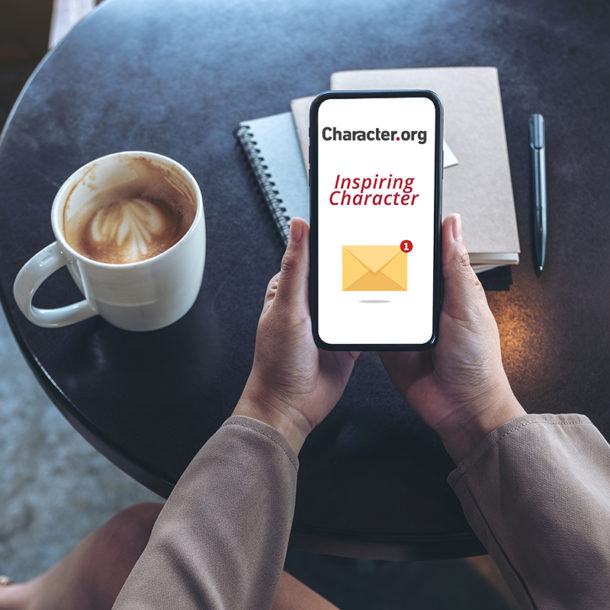By Dr. Arthur Schwartz
When was the last time you stopped yourself and said, “Right at this moment, am I being open-minded?” For me, it was this past week.
Several months ago, I was in Boston at a Kern Foundation convening. One of the organizers was Dr. Samantha Deane, director of the Formative Leadership Education Project at Boston College. During a group conversation, I learned Sam had just written a book about guns and schools. I was fascinated by the book’s title, Democratic Education in an Armed Society: Learning to Live with Guns, and I decided to share her ideas with you right then and there.
About a third of the way through, I had a eureka moment: I suddenly realized I was not being open-minded. Why? Because guns are such an emotionally charged topic, and I kept wanting her ideas to confirm my existing beliefs. That was not happening. Instead, Sam’s ideas were making me feel uncomfortable. She was nudging me to dip into intellectual waters without a life vest.
At the core of Samantha Deane’s thesis is that we must learn how to live with guns. That’s not my mindset. Perhaps that’s why, after recognizing my own confirmation bias, I found her ideas so thought-provoking.
The book begins by examining the myths of America’s gun culture. How owning a gun is tied to what it means to be an American. The belief that without guns, there would be no Independence Day. The enthralling narrative that guns are the tool we need to defend our freedom and liberty.
Deane also explores how guns are tied to our notions of gender. She notes that all but two rampage school shooters since 1979, have been male.
As her title suggests, the book is written for educators. Inspired by John Dewey’s ideas as well as Eamonn Callan’s 2004 classic Creating Citizens, Deane believes our schools can have a transformational role in how our society can begin to live with guns. She suggests three, dare I say, radical approaches:
Let’s develop a school curriculum on guns. Deane writes that “gun-safety education parallels the structure of the arguments for sex education.” Students would learn about guns on several levels, from how they work (similar to a home economics or shop class) to the purpose and history of guns. Deane’s public health perspective is compelling and straightforward. As a parent and educator, she writes: “Guns exist in communities, homes and hearts. It is our responsibility to craft ways to live in their presence.”
Let’s stop the study of war in schools. Deane argues that this perspective has a long history. Horace Mann, the founder of the common school, wrote that schools needed to stop teaching the “insane illusions of martial glory” and focus more on peace and universal brotherhood. Deane shows how nearly all presidents, especially Theodore Roosevelt, lauded the “manliness of war.” The martial virtues, Samantha Deane posits, “represent the apex of masculine social codes” that young men, such as Kyle Rittenhouse, blindly embrace and defend. Her solution is revolutionary: Schools should replace the study of war with the study of democracy.
Let’s teach the tools of democracy (i.e., cooperation and compromise). Deane invites us to imagine a future where there is far more emphasis on “democratic outcomes” than on academic test scores. A future where all students understand, care about and consistently practice the skills needed to be an active, participatory citizen. Where all students can demonstrate – at all grade levels — the “response-ability” to be an upstander. Deane paints a compelling portrait of a future where schools have veered away from a laser-like focus on individual mastery and have boldly become the embodiment of democratic ideals, a laboratory where all Americans are learning how to live together.
Once again, I can’t emphasize enough how many times Samantha Deane’s book challenged my mental models about guns and our American gun culture. Her ideas about metal detectors, school resource officers, weaponizing the staff (and more) challenged what I now know has been my “fixed mindset” on these topics.
Her foundational premise is that we need to get beyond the fear of the next bad apple. Instead, she believes that “every victim of school gun violence is a victim of the narrative and practices we perpetuate in our laws, our norms, and institutions. Sure, individuals do the shooting, but you, me, we are responsible for the narratives and norms that instruct humans how to live and die well in a shared world.”
Do you agree? I welcome your thoughts and comments in a spirit of humility and open-mindedness.
* I dedicate this article to Scarlett Lewis, a Character.org board member. Scarlett’s son Jesse was killed by a rampage shooter at Sandy Hook Elementary in 2012. Several months later, Scarlett founded the Choose Love Movement.
____________________________________
1 Several years ago, I had the honor to serve as the Senior Scholar at the United States Air Force Academy. More recently, the National Medal of Honor Museum invited me to work on a middle school curriculum. These experiences certainly contributed to why, when reading this section of the book, I need to embrace a spirit of open-mindedness.
Stay Connected To Character
Would you like to receive Arthur’s weekly blog post?







I grew up around guns and hunting and our parents taught us about gun safety and the responsibilities of handling any type of firearm. As a former school board member in rural Michigan, I’m interested to read Dr. Deane’s book. I’m not convinced on the surface that foregoing the study of war and the horrors therefrom, is such a good idea, lest we repeat them. I’m all for teaching the purpose and history of guns and our unique right to keep and bear arms in our democracy, as well as the personal responsibility that goes with that right, and of course, teaching the tools of democracy as noted. I am interested to know if Dr. Deane addresses the mental illness aspect of the vast majority of these school shooters, and is there a correlation with our country’s movement away from mental hospital and treatment facilities over the past several decades, which seems blatantly obvious to me. I look forward to reading this book and I appreciate your review and recommendation.
Arthur, first of all thank you for dedicating the article to Jesse. And I agree with this article. In fact, I want to have her on a ChooSELove podcast! There is a lot of money dedicated toward ‘gun control’ every year – the outcome of which is more than questionable as we see more guns and violence than ever before. WHY are our kids killing themselves and each other at unprecedented rates? We must address the root cause or we will never get ahead the the issue, as evidenced by the fact that we are always a step behind. We could use a fraction of those resources to reduce and prevent the suffering that leads to gun violence, mental health issues and and substance abuse. What a concept!
I was immediately intrigued by this article. Just this morning, I saw a news story that TN passed legislation to allow teachers to have guns in classrooms. I was horrified. As a former elementary teacher, and admitted non-gun owner, this makes absolutely zero sense to me to have MORE guns in schools. It seems we should have less guns. However, this article made me stop and think for a moment about other perspectives. I need to process this line of thought and article more thoroughly, but it does align with my general perspective to be open to others’ ideas. While guns just make me sick in general, that is not the experience of others and really our nation’s heritage. Thank you for writing this thought provoking article.
Arthur, thank you for keeping an open mind as you read and engaged with the ideas in my book! You get the spirit of the text just right.
In light of your generous review, I want to emphasize one point that may help readers of this review understand why I focused on living with guns. I focus on what it would mean to live with guns, because I think we must. By most counts, there are more guns than people in the US. So, regardless of what we do about gun laws or mental health support, we need to come to terms with what it means to make democracy with guns. To this end, my book is, I hope, a nudge in the direction of collective responsibility.
thank you for helping me to think outside of my box